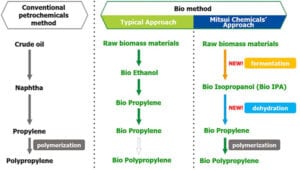
Mitsui Chemical’s approach to production of bio-PP
Mitsui Chemicals, Inc. (MCI; Tokyo; www.mitsuichem.com) is collaborating with Kaisei Inc. (Murakami, Japan) to commercialize bio-based polypropylene (bio-PP).
Japan’s Ministry of the Environment has adopted Mitsui Chemicals’ bio-PP pilot project to build a system to recycle plastic and other resources – this coming as part of Japan’s efforts to reduce greenhouse gas (GHG) emissions. Hereafter, Mitsui Chemicals is conducting the world’s first bio-PP industrialization demonstration test, and plans to conduct multifaceted evaluations of technologies, quality, economic efficiency, and environmental impact such as GHG reduction. Solving these issues, Mitsui Chemicals Group will consider commercialization of bio-PP (production will start in 2024 at the earliest).
Polypropylene has a wide range of applications, spanning automobile parts to medical care products, home appliances, housing and food products. Polypropylene accounts for more than 20 percent of the plastic produced in Japan. However, due to technical difficulties, Production of polypropylene from biomass has not been established at the industrial level.
The new production method being attempted for commercialization sees various biomass — mainly non-edible plants — fermented to produce isopropanol (IPA), which is then dehydrated to obtain propylene in a first-of-its-kind IPA method. Compared to other biomass production approaches studied by other companies thus far, this one could prove to be a more cost-effective way to manufacture bio-PP.
Kaisei Inc. will cultivate biomass raw materials used by Mitsui Chemicals, collect wastes generated from biomass raw materials, and supply electricity to manufacturing facilities and manufactures fertilizers through its effective use. By collaborating with Kaisei Inc., Mitsui Chemicals aims to contribute to society through environmentally friendly action with a circular model that leverages the supply chain.